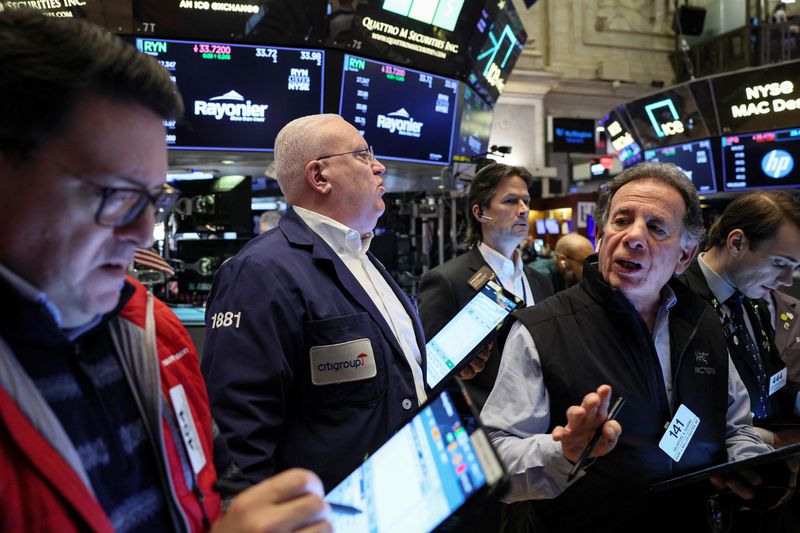US value stocks draw bargain hunters while AI fever rages
By David Randall
NEW YORK (Reuters) -As fervor for artificial intelligence sweeps Wall Street, some investors are seeking bargains in more conventional areas of the stock market.
Value stocks, typically defined as companies trading at a discount on metrics such as book value or price-to-earnings, have largely been left behind as AI put a charge into their growth-focused peers.
However, gains in some value-heavy sectors such as industrials and materials have accelerated lately. Proponents believe that's a sign that the rally in the benchmark S&P 500 index is broadening beyond a handful of tech and growth names.
“There’s clearly an investment case for value stocks over the long term,” said Que Nguyen, chief investment officer of equities at Research Affiliates. “These companies are still very, very cheap and many of them have already gone through the difficult process of restructuring their businesses and balance sheets.”
The S&P 500 is up 7.7% in 2024 and stands at a record high. The S&P 500 Value Index is up 3.3% year-to-date, lagging the 11.6% gain in the S&P 500 Growth Index. Yet some value-heavy sector have shown signs of life in recent weeks.
The S&P 500 industrial sector rose 7.1% last month, driven by rallies in General Electric (NYSE:GE) and Howmet Aerospace. The broader index gained 5.8% in that period.
The materials sector gained 6.7% in February, led by Vulcan Materials (NYSE:VMC) and Ecolab (NYSE:ECL) . Consumer discretionary, home of recent gainers such as Chiptole Mexican Grill and Ralph Lauren (NYSE:RL), rose nearly 9%.
One major draw: value stocks are relatively cheap compared to the rest of the market. The health care sector trades at 18.9 times forward earnings with energy trading at a 12.2 multiple, much less than the 20.8 forward earnings for the S&P 500 after a rally lifted the benchmark 42% from its October 2022 lows.
Michael Hunstad, Northern Trust (NASDAQ:NTRS) Asset Management’s deputy chief investment officer and head of global equities, believes multiples have grown too steep for the S&P 500 and the so-called Magnificent Seven group of growth and technology stocks that have led its rally. Tesla (NASDAQ:TSLA)'s drop of nearly 20% this year illustrates how quickly such stocks can reverse, he said.
"We expect to see more risk to the downside for multiples, particularly among the Mag 7," said Hunstad, who has been increasing his positions in value-focused sectors such as healthcare and energy.
Hunstad also believes value stocks could better weather a prolonged period of elevated interest rates than growth names, as their cash flows are shorter-term and less sensitive to borrowing costs.
While investors still expect the Fed to cut rates this year, they have reduced expectations for how quickly and deeply the central bank will cut rates, as a stronger-than-expected economy could reignite inflation if monetary policy eases too soon.
Next week’s congressional testimony from Fed Chairman Jerome Powell could shed light on policymakers’ views. Investors are also awaiting U.S. employment data next Friday.
Betting against growth stocks has been dangerous over the last decade, when searing rallies in shares of companies such as Apple (NASDAQ:AAPL), Google-parent Alphabet (NASDAQ:GOOGL) and Meta Platforms (NASDAQ:META) led markets higher. The S&P 500 Value index is up about 110% over the last 10 years, compared with a nearly 235% gain in the S&P 500 Growth index.
Broader sentiment toward value has waned, by some measures. A net 13% of fund managers polled by BofA Global Research expect growth stocks to outperform value names over the next year, the highest conviction level since May 2020.
Still, some strategists argue the productivity gains promised by AI could lift all boats long-term, benefiting value stocks as well as growth shares.
Robert Robotti, chief investment officer of Robotti & Company, believes value stocks are likely to see the largest efficiency gains from adopting AI, bolstering their margins and pushing up valuations. He has increased his stake in industrial and healthcare stocks as a result.
"The application of AI is going to be across the entire company and that’s not limited to the guy selling the chip," Robotti said. "It’s the guy buying the chip and increasing his efficiency who is going to benefit.”












 Bitcoin
Bitcoin  Ethereum
Ethereum  Tether
Tether  XRP
XRP  USDC
USDC  Wrapped SOL
Wrapped SOL  TRON
TRON  Lido Staked Ether
Lido Staked Ether  Dogecoin
Dogecoin